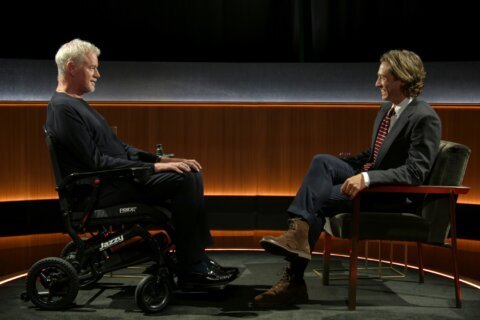In 2008, Clint Eastwood played a “get off of my lawn” curmudgeon in “Gran Torino.”
Now, it’s Tom Hanks’ turn in “A Man Called Otto” (a.k.a. Forrest “Grump”) a movie that is often depressing but ultimately pays off as life affirming as it opens in theaters Friday.
Based on Fredrik Backman’s 2012 novel “A Man Called Ove,” this is the second screen adaptation after Hannes Holm’s 2015 Swedish Oscar nominee for Best Foreign Language Film. The new remake follows Otto Anderson, a grumpy old man living in the suburbs of Pittsburgh who is constantly being interrupted during attempts to commit suicide.
It’s one of Hanks’ darkest roles, a man at the end of his rope, and at the end of his exhaust pipe, and standing on train tracks. His suicide attempts are like Bill Murray in the bleakest stretch of “Groundhog Day” (1993), only this time the annoyingly cheery Ned Ryerson is an exercising neighbor in a track suit named Jimmy (Cameron Britton) inviting him for meals.
Unlike Eastwood’s “Torino,” Hanks isn’t socially backwards. He’s actually progressive, standing up for a trans kid on the street. Technologically, however, he is a proud Luddite, repping common sense and handyman skills as he fetches ladders from his garage or bleeds his neighbor’s radiators to heat their homes, while rolling his eyes at selfie culture.
Of course, his grumpiness is for a reason. Director Marc Forster (“The Kite Runner,” “Stranger Than Fiction,” “World War Z”) skillfully uses slow disclosure to reveal Otto’s grief as he grabs a teacup and the camera lingers on a second teacup on the shelf. We later see an empty side of the bed, while a lucky coin also becomes a telling familiar image.
After these subtle visual clues, Forster intercuts flashbacks of Otto’s wife Sonya (Rachel Keller) and Young Otto (Tom’s son Truman Hanks). Their initial meeting is adorable (I did my best Forrest Gump impression: “Ma’am, you dropped your book!”), but their first kiss and proposal feel a tad rushed. Then again, we’re only seeing Otto’s standout memories.
Screenwriter David Magee, a two-time Oscar nominee for adapting “Finding Neverland” (2004) and “Life of Pi” (2012), does a nice job developing the rest of the neighborhood, particularly a Hispanic couple (Manuel Garcia-Rulfo and Mariana Treviño) and their two cute daughters who crack kid jokes while playing with their lucha-libre action figures.
On the downside, Otto’s falling out with his Black neighbor Rueben (Peter Lawson Jones) isn’t explained well enough, seemingly boiling down to a rivalry over their Ford vs. Chevrolet cars. Reuben’s wife Anita (Juanita Jennings) is such a likable character that it seems odd that she wouldn’t have stepped in to squash such a small spat over cars.
Occasionally, the script is a little too on the nose. The corrupt realtor is named Dye & Merica, as in “Die America,” suggesting that gentrification is killing the working people of this country. The real estate agents are clearly the antagonists of this movie, turning a once authentic American neighborhood into a cookie-cutter series of lifeless townhomes.
Most of us can get behind this underdog subplot and the overall theme of triumphing over grief. It’s inherently tricky making a feel-good movie with so many traumatic moments. The Ricky Gervais TV series “After Life” did a slightly better job of juggling the light and dark, but “A Man Called Otto” is a decent enough American remake of the Swedish original.
As for this D.C. sports fan, I wish they didn’t change the title from “Ove” to “Otto.” How cool would it have been to have a hero named “Ove” set in Pittsburgh? Take that, Crosby.









